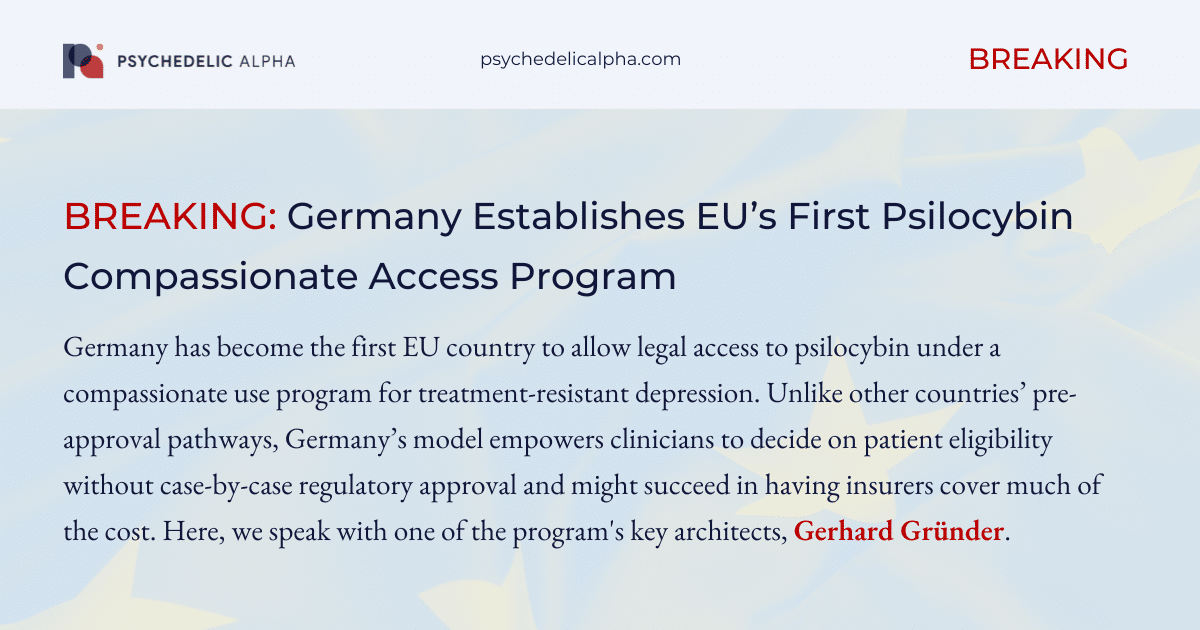While it is similar in some respects, Germany’s new compassionate use psilocybin program has some unique features.
A key feature is that, unlike in some other systems, where regulators like Health Canada are the decision-makers, the German program allows licensed psychiatrists at one of the two sites to decide whether a patient should be included in the program. “This decision cannot be made by any formal regulatory or governmental authority”, Gründer told us. While psychiatrists may decide on patient participation, Gründer remains the ‘responsible person’ for the program.
This means that it will not be necessary to wait for patient-by-patient approval from a regulatory authority, which could represent a significant improvement over other programs, eliminating a key bottleneck in the patient journey and empowering healthcare professionals to make decisions as opposed to bureaucrats.
What’s more, permission need not be sought for every single dose, Gründer told us. “Our protocol allows us to repeat the treatment in case of non-response to a first dose or to maintain the treatment effect”, he explained.
In terms of that protocol, Gründer said that it was provided to BfArM and includes “very strict” rules, “especially with regard to safety monitoring.” The dosing session, for example, will be “monitored by two trained health-care professionals, including one physician”, he told us.
Those rules “cannot be changed”, he emphasised; “they cannot be relaxed.”
For now, the program is limited to CIMH and OVID. Gründer told Psychedelic Alpha that there is the option to add more sites, in time, but that starting with two sites allows them to establish procedures. “We are assuming that there will be lots of interest from other sites”, he said, but they “have to qualify according to criteria that were communicated to the authorities.”
In terms of patient eligibility, patients with TRD (which means those who have not responded to at least two classical antidepressants that were administered for sufficient duration and at a sufficient dose) must show that participation in a psilocybin trial is not possible.
While he wouldn’t share specific inclusion and exclusion criteria with us, out of concern that patients might conceal conditions relevant to safety, he said that “in general, those criteria are more flexible than in clinical studies.”
Aside from site expansion, might the program grow to include other indications? Gründer said that EU regulations stipulate that such programs are only possible in indications “for which there is sufficient evidence and at least one ongoing Phase 3 trial.” “Therefore, the only other possible indication would be [generalised anxiety disorder], but only with LSD”, he continued.
In terms of scale, the group does not anticipate more than 50 patients in its first year, due to limited resources. “We are allowed to treat more”, Gründer clarified.
Other countries’ pre-approval access programs have faced issues with accessibility due to high costs. But this group believes they will be able to offer psilocybin therapy in a much more affordable manner.
Gründer says that the drug itself has to be provided to patients for free, under the terms of the program, and that the treatment “will be part of an overall treatment plan that includes general psychiatric care at both facilities.”
“It will therefore be covered by health insurance of the patients”, he added.
In terms of data collection, the group says that it is very interested in ‘scientific monitoring’, beyond the ‘detailed reports’ it is obligated to provide to authorities on the program’s progress. “In addition to a variety of psychometric scales that will be used to measure outcomes,” Gründer told us, “there will also be accompanying research that will be site-specific”. That will include imaging studies at CIMH, for example.
“We are of course very much interested in sharing these data”, Gründer added.
